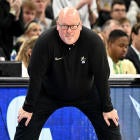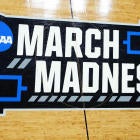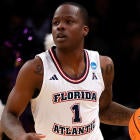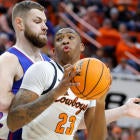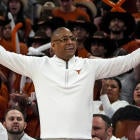
Latest in hoops: Top 25 (and one) | Bracketology | Bubble Watch
BROOKLYN, NY -- After
Here's essentially what happened next. Upon getting to their quarters, all the players got ready for bed. Some time around 1 a.m. the lights were clicked off; Saturday morning's prep for the semi against VCU will come quick.
But before they closed up and got to bed, they had to do something every player's done on every road trip for the last year and half: hand over their cell phones. An assistant coach confiscates them every night at lights-out. He holds them overnight.
And on Saturday morning at breakfast, everyone will get their phones back.
It's an unusual, daring, quite possibly extremely unpopular tactic by almost any coach. Mike Lonergan is wired differently than a lot of guys in this business. Still, considering the age we live in, where most everyone is attached to some sort of device, it's risky. Players these days are no different from most other people: they're in love with their phones because they see them as essential. But Lonergan sees it as a distraction, a reason why his team could wind up losing a game that, in his mind, it shouldn't.
Lonergan got the idea last season from an AAU coach he knows, who said taking phones away from his guys the night before games led his team to be more alert because they got much more sleep. Plenty of players can fall in the trap of being up too late, scrolling a screen, eyes glazed in the dark while texting, playing the latest app or scrolling Twitter for salutes and slights.
After his third-seeded Colonials got their first A-10 tourney win in seven years he said, "We were obviously more well-rested, and it helped us."
Lonergan took a chance on the tactic in 2013, before a team's road game against Rhode Island. When he explained why he wanted to try taking them away from their phones, the players didn't fight the move. The next day they beat Rhody. He's stuck with the practice ever since and said the players now prefer to have the choice taken from them.
Make no mistake: this move would not fly with most programs. Taking the one thing that connects college kids to the outside world is a fast way to losing three or four kids to transfer. But Lonergan's confident, calm, trusting and finally entering a stage of national recognition, something he's fought for since he was barely out of college.
"We came in here and knew we needed to get this win," Lonergan said. "We're fighting for national respect. We've got no bad losses, none outside the top 100 in RPI, but this was a big win for us."
Lonergan's been a real grinder for more than two decades. He admits now that he was too presumptious about his career when he was younger. He got a head gig at D-III Catholic University in 1992, when he was 26.
"I thought I'd be a head coach in Division I by the time I was 30," he said.
Not a chance. He stayed Catholic until 2004, then took an assistant's role under Gary Williams at Maryland. In 2005, eight years after he thought he'd be able to run a D-I team, he finally got the job. Lonergan was hired at Vermont when he was 38. He took UVM to one NCAA Tournament in his six seasons, but an average of 24 wins in his final three years with the Catamounts led George Washington to hire away the local guy who knew the Greater DC area well.
"A lot of people don't know who Mike Lonergan is and I like it that way, I think," he said from the team's empty locker room (with everyone else already waiting on the bus for him at this point).
But even if there's no national perception or pressure on Lonergan and this program, he still feels it plenty. His 83-year-old father took the trip up from Virginia to see this game, no guarantee his son would win against a UMass team that beat the Colonials at GW on Feb. 15.
"There was a lot of people who came up here that I know," Lonergan said. "A lot of people spending a lot of money on hotels. It's Brooklyn. So, yeah, there's a lot of pressure even from just people you know."
Lonergan wanted his first "real job" at 30. He got it at 38. Now he's winning at his hometown one at 48.
"And I feel like I'm 58," he said with a smile.
This win was a long time coming for Lonerga and for GW, which could be staring at a No. 7 seed with one more victory. This phase of George Washington basketball isn't yet known nationally, but wins like Friday's go a long way. Saturday brings the biggest possible opportunity: a date with No. 23 VCU.
When the players wake up Saturday morning, they'll have a familiar message waiting for them. And they won't need a phone to check it.













